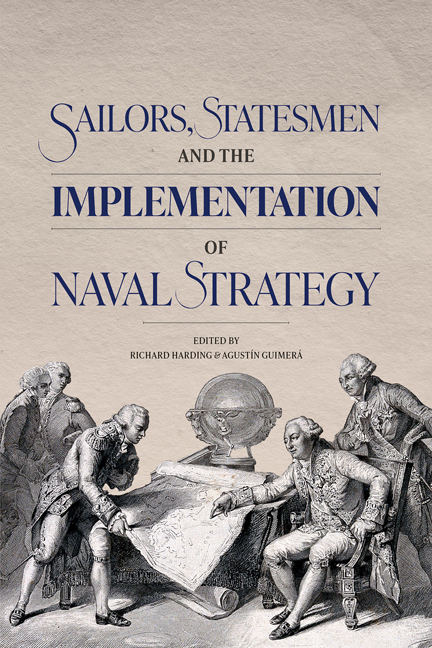Book contents
- Frontmatter
- Dedication
- Contents
- List of Contributors
- Introduction: Naval Leadership: Expertise and Strategy
- 1 The Evolution of French Naval Leadership: Defining the Admiralty of France from the Sixteenth to the Eighteenth Century
- 2 The Makers of Spanish Naval Strategy in the Eighteenth Century: Strategy, Tactics, and Shipbuilding Policy
- 3 Naval Strategic Leadership in Britain, 1739–1748: Political Leaders and Professional Knowledge
- 4 The Statesman and the Naval Leader: The Count of Floridablanca and Navy Minister Antonio Valdés, 1783–1792
- 5 Defining French Eighteenth-Century Naval Strategy
- 6 Casto Méndez Núñez: The Admiral who could have been Regent, 1861–1868
- 7 Teaching by Example: Julian Corbett’s The Campaign of Trafalgar of 1910
- 8 Spanish Naval Leadership during the Second Republic: José Giral Pereira
- 9 The Quest to Understand Naval Leadership: Educating Admirals for High Command in the U.S. Navy from the Eighteenth Century into the Twenty-first Century
- 10 Reflections
- Bibliography
- Index
Introduction: Naval Leadership: Expertise and Strategy
Published online by Cambridge University Press: 08 May 2024
- Frontmatter
- Dedication
- Contents
- List of Contributors
- Introduction: Naval Leadership: Expertise and Strategy
- 1 The Evolution of French Naval Leadership: Defining the Admiralty of France from the Sixteenth to the Eighteenth Century
- 2 The Makers of Spanish Naval Strategy in the Eighteenth Century: Strategy, Tactics, and Shipbuilding Policy
- 3 Naval Strategic Leadership in Britain, 1739–1748: Political Leaders and Professional Knowledge
- 4 The Statesman and the Naval Leader: The Count of Floridablanca and Navy Minister Antonio Valdés, 1783–1792
- 5 Defining French Eighteenth-Century Naval Strategy
- 6 Casto Méndez Núñez: The Admiral who could have been Regent, 1861–1868
- 7 Teaching by Example: Julian Corbett’s The Campaign of Trafalgar of 1910
- 8 Spanish Naval Leadership during the Second Republic: José Giral Pereira
- 9 The Quest to Understand Naval Leadership: Educating Admirals for High Command in the U.S. Navy from the Eighteenth Century into the Twenty-first Century
- 10 Reflections
- Bibliography
- Index
Summary
Since the first few months of 2020 the world economy has been faced by crises that it had not seen for over seventy years. The sudden progress of the virus COVID-19 throughout most of the world forced an unprecedented economic shut-down, bringing predictions of an economic jolt whose repercussions are likely to be felt for many years to come. So new was the virus that most national governments quickly turned to the scientific community to help them understand the epidemiology. They looked to this community to inform decisions relating to the immediate political questions about ending ‘lock-downs’ and organising life in the post-virus world. They barely dared to make a move without the endorsement of some part of the scientific community. However, it was not long before citizens became restless in many parts of the world, particularly the western world. This was reflected in political backlashes and even violence. It was a stark reminder of an old tension that exists within societies between political authority and the authority of experts.
Barely had the global concern over COVID subsided when another major crisis jolted world politics. In January 2022 increasingly aggressive displays of Russian military power on the borders of Ukraine sent tremors through the world's diplomatic channels. While Russian messaging was ambiguous in so far as what Russian grievances actually were and what would satisfy the Kremlin, what was not in question was the expert power of the Russian armed forces. On conspicuous display was the modern hardware and the new tactical organisation of an armed force that had been substantially reformed since 2008. It was believed that if Russia decided to launch a large-scale invasion of Ukraine it would be a short, one-sided affair.
In the event the invasion of 24 February was a dismal failure. The expertise in the operational art and the technological and tactical changes supposed to have radically altered the effectiveness of the Russian military proved illusory. On the ground, in the air, and at sea the expertise of Russian forces was far more limited in combat than initially anticipated. This came only six months after the withdrawal of Allied forces from Afghanistan had also shown that highly developed, expensive military expertise could not prevent humiliation and disaster. In the world of the military, as in civil society, the authority of the experts was undermined.
- Type
- Chapter
- Information
- Publisher: Boydell & BrewerPrint publication year: 2024



